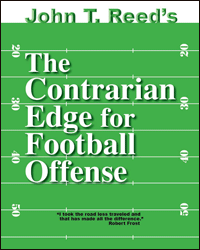WSJ article is the Moneyball of basketball
Posted by John Reed on
A long article in today’s Wall Street Journal is the Moneyball (book and movie) of basketball.
I am not a basketball fan, but this article is excellent and useful even for us non-fans. Google the title to read it online: “Remaking Basketball the Warriors’ Way.”
Silicon Valley strategy applied to basketball
It says that a group of Silicon Valley executives, including billionaire Larry Ellison (Oracle) looked at basketball with a business perspective and found a market inefficiency: three-point shots were more valuable than the NBA coaches and players seemed to realize.
Three-point attempts are a better value than two-point
The expected value (points times success rate of the shot) is .76 points from 23 feet away from the basket (a two-point shot) and 1.09 from 24 feet away (a three-point shot). That is a huge difference over the course of a game and a season.
So the Warriors built a team that emphasized the three-point shot acquiring players who were good at the shot or who complemented those who are as well as a rookie head coach, Steve Kerr, who owned the record for the highest success rate shooting 3-pointers in NBA history.
The result last season was an NBA championship and MVP for Steph Curry, who is the current best three-point shooter. At present, they may break the NBA season wins record.
‘The whole world can be wrong’
Here is a great line from the article, “What’s real interesting is sometimes in venture capital and doing startups the whole world can be wrong.”
That is the story of my professional life. In my book How To Write, Publish, and Sell Your own How-To Book, I said you should only write a non-fiction book when all the existing books are incorrect or incomplete. It sort of goes without saying. It all the existing books are not incorrect or incomplete, you are writing a “me too” book.
Like Joe Lacob, the venture capitalist owner of the Warriors who said that, I, too, have been amazed at how often I find the whole world is wrong.
My book Football Clock Management, said football coaches have been managing the clock incorrectly for 130 years or so. For example, forever, coaches have carried a card that tells them whether to go for one or two points after a touchdown.
I decided to ask, “Is the card correct?” I found two things: some of the score margins had the wrong advice plus the whole idea of using the card after every touchdown was idiotic.

‘Discontinuity’
The Warriors owner used the phrase “market inefficiency.” I prefer “discontinuity.” If you graph most things, the lines are smooth like hills or ramps. But when there are rules as in sports or tax law, a graph sometimes switches from a ramp to stairs.
If you graph football game win probabilities (available on the Internet) by score margin—which is what those go-for-two tables are about—you get smooth lines early in the game and early in the second half unless the score is low.
In other words, whether you go for one or two is not significant then. Basically, whether you go for one or two only matters when it is likely that there will be only one or two more scores in the game. That’s when the win-probability graph turns into a stairway instead of a ramp. So a coach should only use those cards late in the second half.
They do it right now
And indeed, since my book came out, coaches stopped using those cards earlier and TV color men and play-by-play announcers now mention that the card is only useful late in the game when the remaining amount to scoring is likely to be small.
Year-end tax planning
Similarly, the first edition of my book Aggressive Tax Avoidance for Real Estate Investors identified discontinuities in the Internal Revenue Code. One used to be that if you did certain things on December 31st you could take a whole year’s deduction for it.

That created one of those huge stairsteps that you should take advantage of, like stepping back one foot to get behind the 3-point line.
You see magazine articles every December titled “Year-end tax tactics.” Back in the day, those articles told you about stuff like I just described. Then Congress wised up. Now, stuff you do near the end of the year is generally prorated which changes it from a stairstep to a ramp. No more discontinuity. They should stop running those articles, but they don’t.
‘The road not taken’
Another line I love in the article is, “What made the move most attractive was its novelty.”
Ah, that is the main point of my book The Contrarian Edge for Football Offense. It says in football, using a different offense than anyone else uses gives your team a huge advantage. Even more so if it is an offense the opposing coaches have never seen.

Your team is able to get better at what you do on a daily basis in the preseason and during the season. But your opponents only get three or four days to try to figure out how to deal with your unique or even unheard of offense.
High-reps skills
Some corollaries to this theory: the uniqueness of various approaches being equal, use the one that requires the most repetitions to master—like the triple option—because that makes it harder—impossible actually—for the upcoming opponent’s scout team to replicate what you do and give their defense a good look at it in practice.
Ju jitsu
Also, it is good to select tactics that are not only different, but also uses the opponent’s strengths against them, That is more ju jitsu than contrarianism but since you would be the only one doing it, it is also contrarian.
‘Stretch the defense’
Another line I like in the article is, “Stretching a defense makes it easier to score.” That is true in all sports and that’s why my contrarian book has you using game theory to try to make opponents prepare for everything. That’s because if you try to prepare for everything, you will be prepared for nothing.
Stretching the defense means to make them cover more physical territory as well as forcing them to deal with a greater variety of play types and athletes. It forces them to go to a base defense which is sort of a jack of all plays but master of none scheme. Also, contrariansm and unpredictability makes them sit in the same defense all day which makes it easier to prepare for them and defeat them.
Share this post
0 comment

